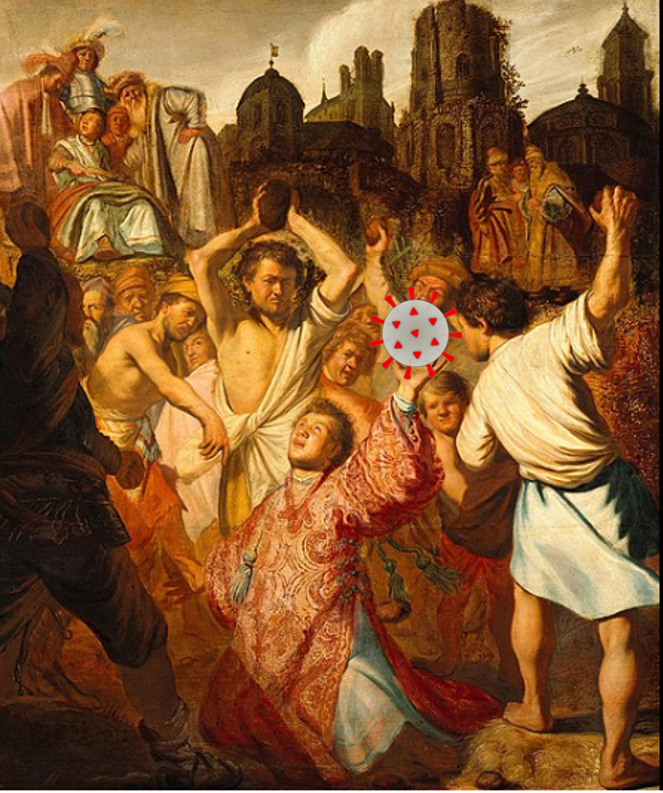Sermon 5/10/2020 “St. Stephen and the virus”
Preacher: Jo J. Belser
Location: Church of the Resurrection “at home” in Alexandria, VA
Text: Acts 7:55-60
Day: 5Easter, Year A, during a pandemic
In this pandemic, this global spread of the coronavirus, can we imagine how the virus’ began? We could suppose the virus first infected a single person where a unique combination of things occurred. Engineers call such an event a “single point of failure.” Cosmologists might call such an occurrence a “singularity.” In either case, one new thing happens, a unique thing, and a whole new reality is born.
We don’t know how the coronavirus first infected a human being. Speculation is the virus has existed in bats and somehow jumped to humans. There is now even a tiger in a New York City zoo with the virus. But there also were, as of last Wednesday, 3.68 million confirmed coronavirus cases worldwide. Somehow, the virus went from the first infected human to almost 4 million people today.
We don’t know whether the first human with coronavirus died of the disease, but clearly, he or she passed it on. One person spread this new condition to others, and they each, in turn, passed on the disease. Before long, every country in the world had coronavirus cases. Actually, all but 13 countries, including North Korea, have reported people with the disease. We suspect this is a reporting failure.

I thought about all of this when I read the first lesson today from the Book of Acts. This passage recounts part of the story of Stephen, the Christian Church’s first martyr. What had Stephen done that so enraged people to stone him to death?
Stephen’s story begins some 68 verses before today’s lesson begins. In the earlier portion of Stephen’s story, he had been chosen by the people to be among the first seven to be ordained Deacons. Stephen, Acts says, was full of faith and the Holy Spirit, and full of power, performing great wonders and miracles among the people.
Stephen also preached “in your face” Jesus sermons in the Greek synagogues, sermons that ultimately caused his arrest, trial, and execution—or—his impromptu stoning. We can’t tell, because the passage devoted to Stephen’s martyrdom tells the story two ways.
In either case, though, the narrative makes clear the Jewish leaders were involved. What is also clear is that Stephen acted like Christ Jesus during his trial and execution. He was silent to the charges brought against him, except to report his vision of Christ Jesus in heaven ready to receive Stephen. Stephen even forgave those who killed him, as Christ Jesus had done on the cross.
The sermon Stephen gave to the Jewish leaders at his trial appears to be a lengthy summation of what he had been preaching in the synagogues: a reinterpretation of Jewish scripture in light of the coming of the Christ. I wonder from Stephen’s harshness against Jewish leaders whether this sermon was the testimony against Stephen rather than Stephen ranting at the Council. In either case though—a new sermon by Stephen to the Sanhedrin or testimony to the Council charging heresy in what Stephen had preached—those who heard the sermon were so enraged they decided he had to die, so they dragged him outside town and stoned him to death, but not before he forgave those who were killing him.
There you have it: the second singularity in the spread of Christianity. The first, of course, the greatest singularity of all time, was the coming of Christ, jumping the God-human interface to enter human history. Stephen’s Christ-like death and the remarkable singularity of him forgiving his executioners while they were murdering him in turn caused awe and faith in those who were present. Acts tells us how, in this way, Christ Jesus’ Spirit spread to one of his executioners named Saul, who in turn later as the Apostle Paul witnessed to others, spreading the Good News of Christ Jesus’ coming to the whole world.
Unlike pandemics that kill us, the “infection” of belief and faith in Christ Jesus gives us life.
I have used an analogy of the spread of the coronavirus to think about how Stephen’s martyrdom began a whole new human reality. The last thing to think about in Stephen’s story is that his response to the Jewish authorities did not allow them to “flatten the curve” of the spread of belief in Christ Jesus. What we have learned recently about virus transmission rates is that a virus dies out when those who are infected pass the virus to fewer than one person, on average.
If—and this is a big if—Christianity is “dying” today, as some claim, then we Christians have not successfully shared our love of God and faith in Christ to one or more other persons.
If—and this is a big if, to us—Church of the Resurrection is “dying” today, as some claim, we have not successfully shared our love of Christ Jesus and our faith in this community to one or more other persons.
These things are not a matter of our Church’s survival; churches come and go as God has need of them. Rather, our success in telling others about Christ is a matter of their survival.
We have a great opportunity during this pandemic. Before everyone we know gets distracted by life again, tell them what you miss about not being able to worship in-person as a community. Before your children stop buying your groceries for you, tell them what difference your faith has made in your and their lives. But even if you never tell anyone about your faith, we can continue to “infect” the whole world anew with Christ Jesus’ love.

